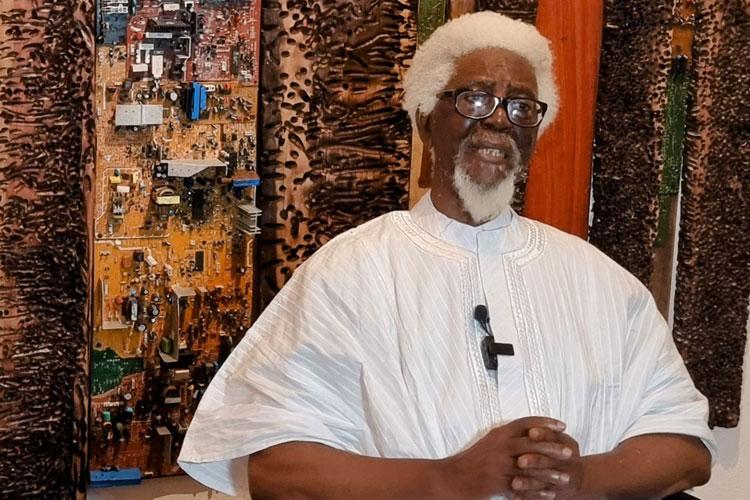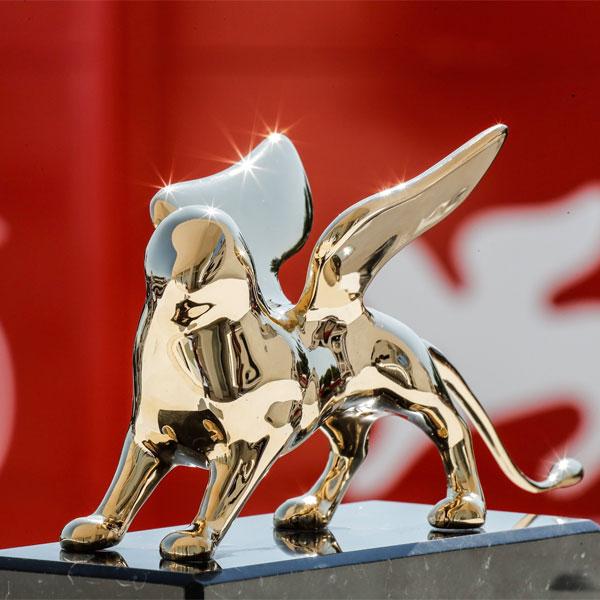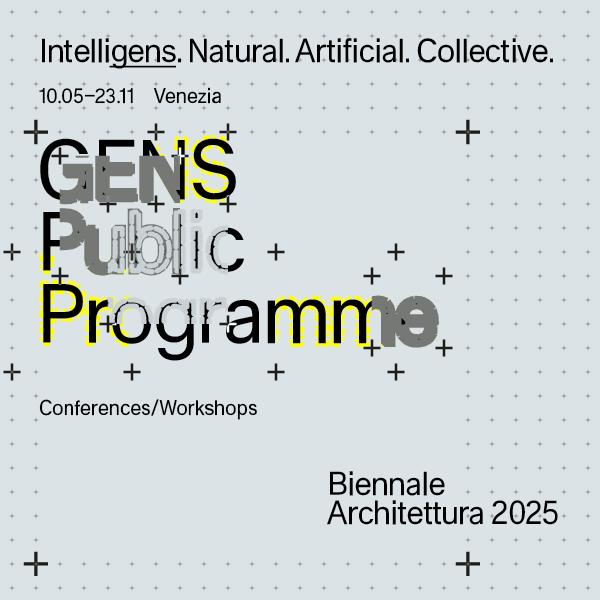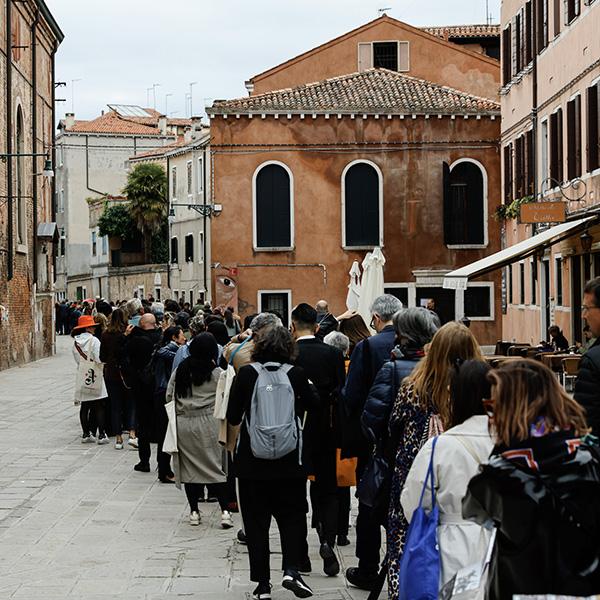
Demas Nwoko Golden Lion for Lifetime Achievement of the Biennale Architettura 2023
The Award Ceremony will take place on Saturday 20 May 2023 at Ca' Giustinian, headquarters of La Biennale di Venezia.
Golden Lion for Lifetime Achievement
Demas Nwoko, Nigerian born artist, designer and architect, is the recipient of the Golden Lion for Lifetime Achievement of the 18th International Architecture Exhibition of La Biennale di Venezia entitled The Laboratory of the Future (Giardini and Arsenale, 20th May - 26th November, 2023).
The decision was approved by La Biennale’s Board of Directors chaired by Roberto Cicutto, upon recommendation of the Curator of the 18th International Architecture Exhibition, Lesley Lokko.
The awards ceremony and inauguration of the Biennale Architettura 2023 will be held on Saturday 20th May, 2023 at Ca’ Giustinian, headquarters of La Biennale di Venezia.
Statement by Lesley Lokko
«One of the central themes of the 18th International Architecture Exhibition is an approach to architecture as an ‘expanded’ field of endeavours, encompassing both the material and immaterial worlds; a space in which ideas are as important as artefacts, particularly in the service of what is yet to come. With all of its emphasis on the future, however, it seems entirely fitting that the Golden Lion for Lifetime Achievement should be awarded to someone whose material works span the past 70 years, but whose immaterial legacy – approach, ideas, ethos – is still in the process of being evaluated, understood and celebrated.
Baba (a Nigerian honorific title) Demas Nwoko is everything all at once: an architect, sculptor, designer, writer, set designer, critic, and historian. When pushed, he refers to himself as an “artist-designer”, which speaks both to the polyglot nature of his talents and oeuvres, and to the rather narrow interpretation of the word ‘architect’ that has arguably kept his name out of the annals.
The son of a traditional Obi (ruler), he was born in 1935 in Idumuje-Ugboko, southern Nigeria. His early forays into painting, drawing, and carving at secondary school in Benin City pushed him to apply for a place to study architecture at the Nigerian College of Arts, Science and Technology in Zaria. However, his discovery that the course focused more on technical drawing skills than the creative imagination prompted him to change tack, applying instead to study fine art. He was a founder member of the Zaria Art Society – a group that included Yusuf Grillo, Bruce Onobrakpeya, Uche Okeke and Simon Okeke, also known as the “Zaria Rebels” – who were interested in a blend of modernity and African aesthetics as an authentic language to reflect the spirit of political independence growing in the 1940s and 1950s.
This profound desire to blend and synthesise, rather than sweep away, has characterised Nwoko's work for over five decades. He was one of the first Nigerian makers of space and form to critique Nigeria’s reliance on the West for imported materials and goods, as well as ideas, and has remained committed to using local resources.
Although relatively few, Nwoko’s buildings in Nigeria fulfil two critical roles. They are forerunners of the sustainable, resource-mindful, and culturally authentic forms of expression now sweeping across the African continent – and the globe – and they point towards the future, no mean achievement for someone whose work is still largely unknown, even at home. In 1977, writing about Nwoko’s first commission, to build the complex for the Dominican Institute in Ibadan, the architectural critic Noel Moffett wrote: “Here, under a tropical sun, architecture and sculpture combine in a way which only Gaudí perhaps, among architects, has been able to do so convincingly.”
It gives me enormous pride and pleasure to award the Golden Lion for Lifetime Achievement to Demas Nwoko, an architect of both the 20th and 21st centuries, and to encourage all visitors to the 18th International Architecture Exhibition to visit the small but perfectly formed and articulated display of his work in the Stirling Pavilion in the Giardini, alongside the Book Pavilion Project of The Laboratory of the Future».
Biographical notes
Demas Nwoko is a Nigerian born artist, protean designer, architect and master builder who was at the forefront of Nigeria’s Modern Art movement. As an artist, he strives to incorporate modern techniques in architecture and stage design to enunciate African subject matter in most of his works. In the 1960s, he was a member of the Mbari Club of Ibadan, a committee of burgeoning Nigerian and foreign artists.
Prince Demas Nwoko was born in 1935 in Idumuje Ugboko, Nigeria, in Aniocha North Local Government area of Delta State to Obi (King) Nwoko II. Nwoko grew up in Idumuje Ugboko, inspired by the newly-constructed architectural residences in the town and the Palace edifice of the Obi, his grandfather, who designed the palace himself. Further extensions to the palace were commissioned by Nwoko’s father.
He studied at the Nigerian College of Arts, Science and Technology in Zaria (1957-1961), where he was a prominent founding member of the Zaria Art Society. This influential group of artists, popularly known as the ‘Zaria Rebels’, promoted natural synthesis: a concept of art coined by the artist Uche Okeke, which bridged their Western training by colonial educators with a focus on African themes and narratives. The Zaria Rebels contributed to the postcolonial modernist vanguard in Nigeria in the early 1960s, along with their peers in literature, theatre and music.
In 1961, Nwoko received a scholarship to study at the Centre Français du Théâtre in Paris, where he studied theatre architecture and scene design. After university, he returned to Nigeria to lecture at the newly formed School of Drama at the University of Ibadan. Reconnecting with his old member of the Zaria Art Society, Nwoko went on to establish spaces such as the Mbari Writers and Artists Club, developing a new art that blended African and Western modernist aesthetics, forms and processes to reflect the spirit of political independence. Nwoko’s first commission to build the complex for the Dominican Institute in Ibadan occurred in 1970, though he had already commenced his architecture work at the New Culture Studios in Ibadan, in the late 1960s.
He founded the New Culture Studios in Ibadan, which is presently run as a training centre for the performing arts and a design center. Nwoko also founded (the now defunct) New Culture Magazine, in the 1970s, a publication that documented contemporary art and culture.




